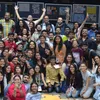This former Teach for India fellow is making learning fun by taking real-life problem statements to the classrooms
Vivek Vashisht’s startup Imbue Education works with school students to provide experiential and project-based learning at summer workshops to make learning fun.
The sight of young children selling pens or flowers on the roads is a too-common one in the country. It is difficult not to register the implications behind it: a lost opportunity at education and a bleak future for most of these young ones.
“These children should be in school and getting good quality education instead of selling or begging on streets,” was the thought that repeatedly struck Vivek Vashist (28), when he was working as a Teach For India fellow from 2014 to 2016.
There are 300 million children in India with untapped potential and little to no access to education. Towards bettering the prospects for a percentage of these children, Vivek, through his fellowship, brought education within the grasp of 35 enthusiastic children in the low-income community of East Delhi.

Vivek Vashisht
Those were the beginnings of his immersive journey to further the cause of education. Now, Vivek’s initiative, Imbue Education, provides experiential and project-based learning to school students in a bid to make learning fun.
Speaking to SocialStory, Vivek says,
“Our tagline is – out of syllabus brings in all the elements that the standard curriculum fails to address. Almost everyone in India during their school days has used it as an excuse – ‘We couldn’t answer the questions as they were out of syllabus’. Education should not be limited to the curriculum. The attitude towards learning has to change from answering questions to understanding concepts and the application around them.”
Founded in 2018, Imbue was born out of insights Vivek gathered during his TFI fellowship and the skills learnt during his two-year corporate stint at Goldman Sachs immediately after. Says the edupreneur,
“At GS, I was working as an analyst in human capital management. I wanted to have the corporate experience in order to build my project management skills and have the experience of working on a large scale. I was clear about wanting to open my own startup in education after that.”

Children at Imbue.
A home-grown model for success
To date, Imbue Education has worked with nearly 300 students, in the age group of 10-14 years, through interactive workshops and a unique syllabus.
The Delhi–based organisation provides a specially-curated experiential curriculum and project-based learning and trainers for the workshops.
Its out-of-school workshop model reaches out to students through word-of-mouth and pamphlets. The course offered by Imbue currently addresses problem-solving through the application of the basics of electronics. Some of the concepts covered in the workshops are basics of electricity, motors, Arduino programming, wireless communication, Bluetooth, GSM, sensors, web development, and design thinking — all of which are taught experientially.
“For the schools, we reach out to them individually, explaining to them the model we deliver. We tailor it according to the school’s needs, if any,” explains Vivek.
The teaching and learning approach
The organisation focuses on taking children away from a grading system which constantly pushes them to study to score rather than to learn and apply. To achieve this, Imbue has built an environment where children are encouraged to work on projects as a team, and none of their ideas and efforts goes unheard and unseen.
At Imbue, students are provided with project-based learning that focuses on developing hands-on experience for students and their skills in creativity and problem-solving. In the workshops, the children develop prototypes that can be put to test and become user-ready.
Says Vivek,
“The concepts taught in school are combined to create a project. The objective or the application of the project is linked to a real-world problem. The students then design the prototype while applying the concepts they are learning and test their prototype on the field to take real-time feedback.”
Through one of Imbue’s courses, for instance, a group of class six students have developed a smart stick for the visually challenged, which was tested with a blind person.
At the end of the course, comprising of a series of workshops and organised during the summer vacations, the children are given a certificate.

Vivek with the students.
The impact so far
The team at Imbue Education, led by Vivek, has successfully challenged theories on students having an attention span of less than 30 minutes and the validation of the age-grade curriculum.
In the workshops conducted by the organisation, students—working for more than eight hours all by themselves—have learnt concepts beyond their grade levels and created diverse prototypes by themselves.
Says Vivek,
“We need to make learning fun and meaningful. With Imbue, the learning is more dynamic and the workshops are engaging as the students are provided with problem statements that they can discuss and own rather than just memorise the right answers.”
Challenges along the way
Like the founders of most startups and all initiatives, Vivek too faced a fair share of struggles in the beginning.
“From designing pamphlets to having them printed, and going to nearly 2000 houses to get parents to enrol their children in our course, and then anxiously waiting for call-backs and not earning anything at the end of the month — it felt like being part of a wicked economic regression equation,” he says.
Initially, only two parents signed up for the programme, recalls Vivek.
“The two parents are still with us and have recommended the program to others. We have a small group of 12 parents now who send their children to our workshops. And, they have even asked us to start our own school and said they would be willing to take their kids off the traditional education system,” shares Vivek.

Learning through fun activity.
The business, the team, and the path ahead
Imbue Education has a simple revenue model comprising various pricing points depending upon the need of the school. Started with Vivek’s savings, the organisation has raised seed funding from MR Vikram Jiet Roy, CEO of Maccaferri, to scale up its operations and to experiment with learning methods that would be most impactful.
To train the children in real-world applications, Vivek has 10 full-time and part-time associate team members. As mentors, the team has Vikram Jiet, Sachin Gaur as a talent coach, and Mukesh Ralhan, who takes care of the marketing.
“Currently, we are developing sessions for parents on how they can help their kids. Teacher training is the next domain that we will be getting into,” shares the entrepreneur, adding that they are looking at training nearly 10000 teachers across India who can deliver their workshops in schools."

The team of Imbue.
The team is also aiming to integrate different areas of expertise to solve complex issues of society through projects enabled by school children.
“Problem-solving needs to integrate different subjects. For example, to make the smart stick for the blind, we needed to understand the physics behind the eyes, sonar, echolocation, among other concepts, maths to calculate speed, distance, and height, and electronics for sensors and coding. Another example of a project we can tackle could be fire alarms for schools. We would teach students how to build one and install it in their schools,” explains Vivek.
The organisation aims at reaching out to 10 million students in the next 10 years and is working on creating low-cost plans to make quality education accessible to a larger number of children across the country.
“Education needs to provide you with the tools to solve problems. It needs to be delivered in a way that doesn't end up stigmatising students making mistakes and instead helps them learn,” signs of Vivek.
(Edited by Athirupa Geetha Manichandar)









